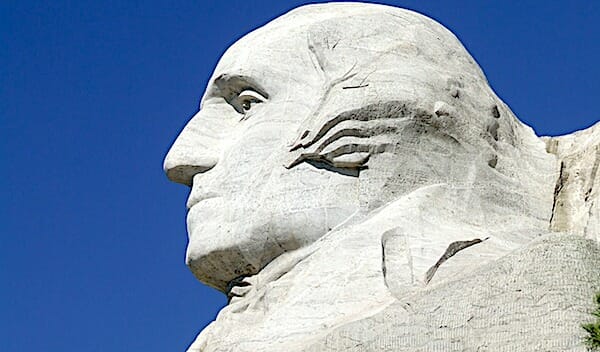With President’s Day (Feb. 19) and George Washington’s birthday (Feb. 22) falling this week, I’ve got some fascinating information to share that I dug up.
Like you, I’ve been watching how mainstream media have reported on the presidential race and debates.
While watching some coverage, I discovered some research showing that even George Washington endured severely harsh treatment from “news outlets.”
Could it be true that the media maligned the national leader many over the past 250 years have called “the greatest general and best president ever”?
Shannon Duffy, Ph.D., who is a scholar on colonial and revolutionary American history and the senior lecturer at the History Department of Texas State University, wrote a great article in The Digital Encyclopedia of George Washington, simply titled, “Press Attacks.”
Though George Washington was the Golden Child when unanimously entering politics by the will of the people, the once famed general was eventually roasted by “personal attacks questioning his integrity, republican principles, and even military reputation,” according to Dr. Duffy.
Washington was first criticized by the press for acting like King George, maligned for his “monarchial” style and “aristocratic” behavior.
Our first president was assailed for proclaiming that the U.S. would remain neutral in the feuds between Revolutionary France and Great Britain. He was also accused of overstepping his authority by negotiating the Jay Treaty with Britain.
During this period, individuals using pseudonyms such as “Valerius,” “Juricola,” “Portius” and “Belisarius” wrote letters to Washington that were made public and printed as part of an extensive newspaper war against the president. (Much of Washington’s official correspondence papers addressed this media assault.)
For example, “Belisarius” launched a tirade against Washington’s first years in office: “a brief but trite review of your six years administration, mark the progressive steps which have led the way to the present public evils that afflict your country. … the unerring voice of posterity will not fail to render the just sentence of condemnation on the man who has entailed upon his country deep and incurable public evils.”
So powerful was the media campaign that some of Washington’s own Cabinet turned against him. As a beacon and pillar for liberty, disgruntled Secretary of State Thomas Jefferson eventually resigned from his position and was “a key figure behind the scenes in establishing the opposition presses,” according to Duffy.
Jefferson criticized an alleged over-controlling Washington and his administration for squelching democratic freedoms: “Their sight must be perfectly dazzled by the glittering of crowns and coronets, not to see the extravagance of the proposition to suppress the friends of general freedom, while those who wish to confine that freedom to the few, are permitted to go on in their principles and practices.”
Thomas Paine, whose writings once aided Washington and the American Revolution, turned viciously against the president, accusing him of abandoning his veterans of war: “Monopolies of every kind marked your administration almost in the moment of its commencement. The lands obtained by the revolution were lavished upon partisans; the interests of the disbanded soldier was sold to the speculator; injustice was acted under the pretence of faith; and the chief of the army became the patron of the fraud.”
Paine went so far as to disavow Washington’s great Revolutionary leadership, giving credit instead to France for the victory of war, as well as predicting that history would record the same: “The world will be puzzled to decide whether you are an apostate or an impostor; whether you have abandoned good principles, or whether you ever had any.”
Whatever charges hurled by Washington’s revolutionary colleagues, none could compare with the actual editors of the newspapers.
Benjamin Franklin Bache, under his editorship of the General Advertiser and Aurora, took the lead in crippling and abusing Washington’s character and leadership.
Bache penned about his goal: “Our chief object … is to destroy undue impressions in favor of Mr. Washington.” He wrote that Washington was “treacherous,” “mischievous,” “inefficient” and was bent upon his “stately journeyings through the American continent in search of personal incense,” his “ostentatious professions of piety,” his “pusillanimous neglect,” his “little passions,” his “ingratitude,” his “want of merit,” his “insignificance” and his “spurious fame.”
Imagine how hot the fires of media and public opinion might have become for Washington if our new republic had television and the internet?
What did in fact exacerbate Washington’s bad press were new federal laws that made it less expensive to send newspapers through the postal system, prompting the proliferation of newspapers from around roughly 50 in 1776 to 250 by 1800.
As Dr. Duffy concluded, “Newly aggressive newspaper editors spurned the old standard of impartiality, taking a stronger role in shaping the newspaper’s message in support of, or in opposition to, the government.”
Media bias in support or opposition of one candidate over another?
As King Solomon once wrote, there truly is “nothing new under the sun.”

